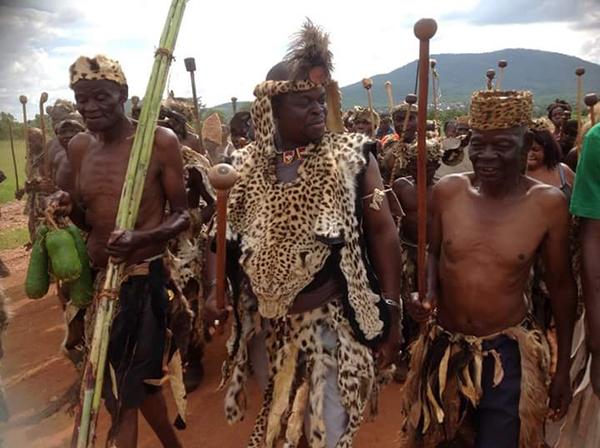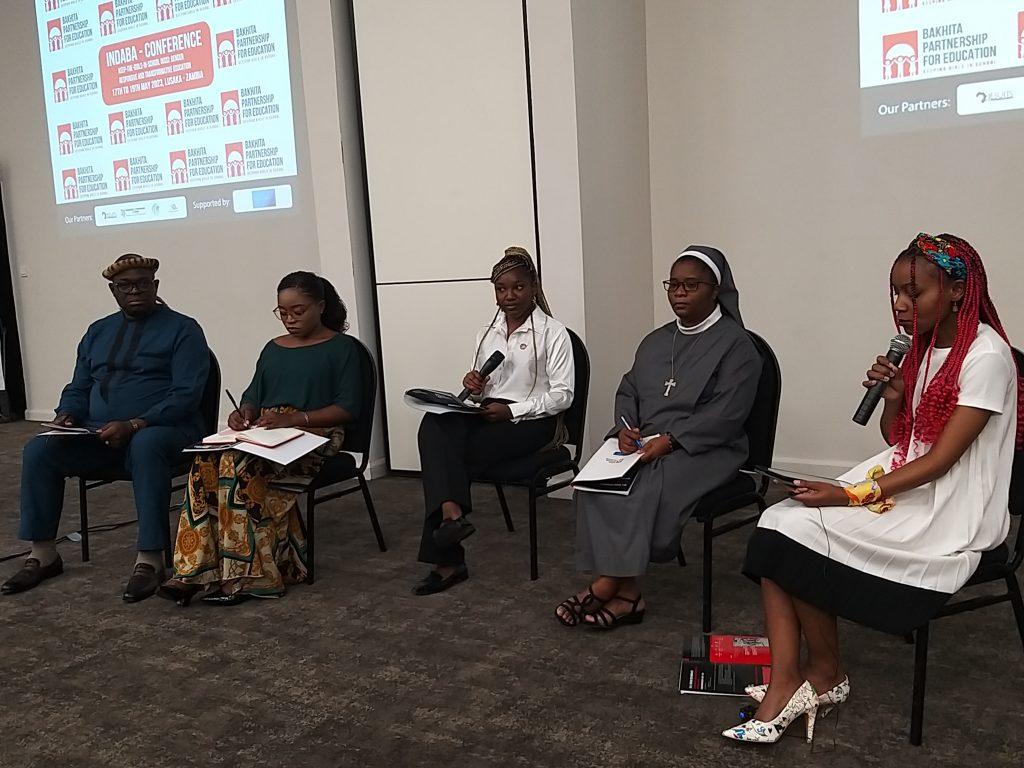Chief Madzimawe tackles gender-based violence
…The traditional leader said the idea of keeping girls in schools was one of the surest measure to protect a girl child from traditional harmful practices.

By Francis Maingaila
Lusaka, Zambia24 (18-05-2023) – His Royal Highness Chief Madzimawe of the Ngoni people in the Kasenengwa district of Eastern Province in Zambia has proposed total cultural transformation as a measure to fight negative stereotypes against girls.
The Chief spoke to delegates at the ongoing Bakhita Partnership for Education (BPE) Indaba on Africa Education for girls and said that measures should be put in place to help boys learn about the transformation girls undergo in their lives.
Regarding the Warriors Treaties that countries around the world commit themselves to regarding children’s rights, Chief Madzimawe emphasized the importance of traditional and religious leaders, who are key figures in addressing these challenges.
He singled out initiation ceremonies for young girls and the preference for boys to go to school over girls as major issues.
Chief Madzimawe discussed the diverse cultures in many countries depending on ethnicity but noted that there is one major common challenge around initiation ceremonies.
He talked about introducing bylaws at the chiefdom level to stop or curb these harmful customs, while also putting policies within the chiefdoms. The chief emphasized the importance of the palace in setting policy by taking advantage of the guidance of influence.
The Chief discussed the queen mother as being central to addressing gender-based violence, which contributes to child marriages and teenage pregnancies.
He also talked about a secretariat that fights gender-based violence, noting that they are trying to create a more conducive environment for young people across the chiefdom.
Chief Madzimawe discussed how he and his team have created a platform that has seen many young people excel in education, producing nurses and teachers from the same arrangement.
He emphasized the importance of harmonizing bylaws so that each chiefdom can have them, and these bylaws should conform to national and regional laws.
The Chief also highlighted some issues, such as the need to interrogate why some laws are not being respected and enforced, and those who are mandated to follow them.
He said that they need to respect the laws and responsibilities they are mandated to follow, or they should not be where they are.
Chief Madzimawe highlighted gender-based violence (GBV) as a major issue that leads to social ills and puts pressure on girls in society.
He explained that his chiefdom has implemented homegrown interventions to protect girls, which include transforming cultures that hinder the promotion of education.
The Secretariat at the palace is manned by young people who can volunteer and run the office, conduct research, and further their education.
Chief Madzimawe emphasized the importance of data collection to measure progress and the need for periodic outreach programs to change mindsets and tackle issues related to early marriages, teenage pregnancies, poverty, and maternal health.
He noted that penalties for men who do not support their wives are included in their bylaws, and health facilities are designated for maternal health cases.
The program has resulted in no maternal deaths recorded from 2020 to 2023.
The Chief highlighted the increase in reported cases of GBV and early marriages, which indicated that people were now coming out to report their cases.
The COVID-19 pandemic caused a regression in games, with girls dropping out and being pushed into early marriages.
The Chief explained that counseling and monitoring were essential, especially for cases without tangible evidence, and that small communities organized by his chiefdom were responsible for child protection.
The Chief emphasized the value of enhancing education and protecting young girls, which provide benefits to everyone in the community.
He said the idea of keeping girls in schools was one of the surest measure to protect a girl child from traditional harmful practices.
Chief Madzimawe also urged Traditional Leaders to End Harmful Practices Affecting Girls
Chief Madzimawe has called upon traditional leaders across Africa to move beyond speeches and take effective measures to eradicate violence against girls.
The Chief emphasized that leading by example is crucial. In some African cultures, multiple marriages are allowed.
Therefore, traditional leaders need to take a stand and declare that no young girl should be married, and they should be sent to school instead.
However, it is not enough to merely speak out against harmful practices. Traditional leaders need to start addressing cultural practices from the ground up.
There are societal traditions that restrict women from visiting palaces or being in the presence of a chief during certain periods each month.
Chief Madzimawe stressed that many of these practices are harmful and useless. Cultural reform is necessary to eliminate them.
Chief Madzimawe recounted how he took action when he noticed that young girls in his village used cloth instead of sanitary products during menstruation.
This situation prompted him to speak with his daughter and other girls about the importance of sanitary pads.
He urged that his actions as a responsible father and husband should set an excellent example.
The Chief expressed that young men must be involved in discussions surrounding the challenges that girls face.
By being aware of the physical and emotional changes affecting girls, young men can provide emotional and mental support to their sisters and their community.
He further called on young people to consider becoming special education teachers- professionals who would be trained to provide targeted care and counseling to girls who experience abuse and violence.
Through this system, girls could be given opportunities to share their stories and gain support.
The Chief concluded by calling for people to learn sign language to communicate better with those who have disabilities.
He believes that providing education and life skills to everyone will create a society that is more inclusive and equitable.
UNESCO- Sustainable Development Goal Number Four (SDG4) Yourh Network Member Motunrayo Fatoke, has called on governments to make education for girls relevant to their needs by providing resources for skills development.

Fatoke pointed out that some organizations are already doing great work, like those that support girls with disabilities, child trafficking victims, and marginalized communities.
She believes we can learn from these organizations and bring together stakeholders to address challenges more cohesively and effectively.
To make this initiative trickle down to grassroots levels, Fatoke suggested that programs and projects must be agenda and gender-focused, specifically targeting the education of girls.
She also stressed the need to contextualize solutions to make them more relevant to the African reality, as local circumstances vary from country to country.
Fatoke believes that initiatives, such as providing menstrual hygiene kits, should be prioritized, as many girls leave schools for several days due to a lack of menstrual health resources. Private sector actors and stakeholders should partner to provide sanitary facilities in schools.
Girls must have access to these facilities to break down barriers to education.
Documentation is also critical for marginalized communities, such as refugees.
Fatoke suggests providing documentation to refugees so that they can access basic needs, including education and working opportunities.
Fatoke also highlighted the importance of sharing best practices across traditional leadership to reduce cases of child abuse.
Traditional leadership should work together to foster an environment of support for girls and women in their communities.
Fatoke believes that skills development is essential for young people to have agency and drive change.
She emphasizes that youths must be involved in designing and implementing policies, not just invited to conferences and gatherings. It’s necessary to involve them from the policy’s drafting and design to its implementation.
Funding for education is critical, particularly for tertiary education, which is crucial in creating relevant innovations that drive change.
Access to quality education is vital beyond foundational and secondary education. Resources are necessary for acquiring knowledge and skills to advance and create opportunities.
Stakeholders should provide resources to advance youths’ studies and drive innovation.
Fatoke stresses the importance of seeing youths as capable of driving change with their skills and creativity. It’s crucial to involve them in the processes, not just organize them for advocacy.
Youths inherit the challenges of the previous generation, making it necessary to involve them in creating relevant policies. Stakeholders must prioritize accessible education and funding for youths to advance their knowledge and skills.
Sister Elizabeth Yawila, a Head Teacher believes that inclusive education is an extension of children with different disabilities, and they must each be handled differently based on their specific needs. Children with physical, hearing, learning, and visual impairments require different levels of attention from their teachers.
Communication is a significant issue, particularly for hearing-impaired children, as it can create a communication gap between them and their parents and the broader community. Sensitizing parents to basic sign language can help bridge the gap and assist in supporting their children’s education.
The Ministry of Education and other stakeholders have provided tablets to learners, and the teachers have been trained on how to use them. However, the challenge is whether the teachers are implementing what they have learned in helping young girls acquire quality education.
Elizabeth stresses the need for more teachers and facilities to cater to children with disabilities in schools, and the stakeholders must ensure they are available and enough to provide quality education.
Refugee Student, Southern New Hampshire University (SNHU Oricia Makonda took time to sensitize delegates about the difficult circumstances faced by refugees, who often struggle to find ways to make ends meet.
She argued that refugees need more resources, especially for education, since it can ease the difficulties they face.
Makonda is a scholarship student pursuing her second degree, thanks to innovative online education.
She argued for the provision of work permits for refugees, emphasizing that having a degree without an opportunity to work is pointless.
Refugees need to be self-sustainable, and they require education and work to achieve that.
Makonda pointed out several difficulties regarding the issuance of travel documents, where they had to wait an unreasonable amount of time.
She emphasized the need to be aggressive about voicing their concerns and fighting for their rights.
However, she acknowledged the stereotypical notions around aggressiveness and called upon women to be proactive and speak out.
Overall, Makonda calls upon policymakers to prioritize refugees’ needs by providing access to education, work permits, and support with travel documents, enabling refugees to become self-sustainable.
